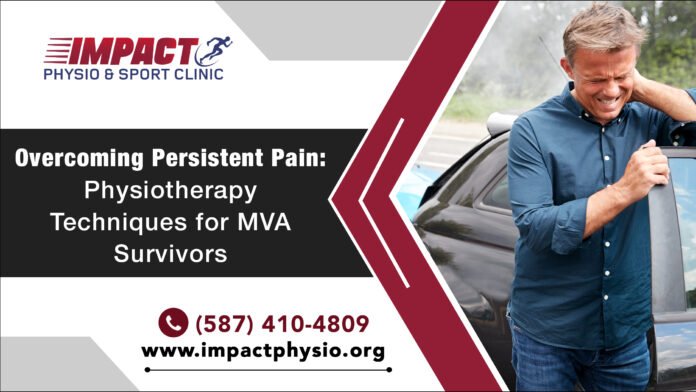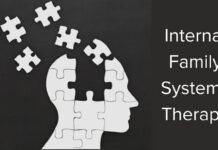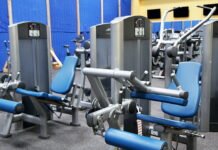Last Updated on July 16, 2024 by Asfa Rasheed
Surviving a motor vehicle accident (MVA) is the first step in a long journey of recovery, especially for those dealing with persistent pain that complicates their path to healing. Motor vehicle accident physiotherapy in Beaumont offers a beacon of hope for MVA survivors, employing a range of specialized techniques tailored to address the unique challenges and injuries resulting from such traumatic events.
Through MVA physiotherapy, patients receive personalized care designed to reduce pain and reinstate mobility, strength, and functionality. In Beaumont, physiotherapy clinics have the tools and knowledge to guide MVA survivors through their recovery, offering support at every step.
Table of Contents
Common Injuries and Physiotherapy Techniques for Managing Pain
Whiplash
Whiplash occurs when the neck experiences a swift and intense jerking motion akin to the lash of a whip, resulting in injury. Often stemming from rear-end vehicle collisions, this injury frequently leads to symptoms such as neck discomfort and rigidity, headaches at the base of the skull, and dizziness. Whiplash can cause persistent pain due to muscle and ligament damage in the neck and upper back.
MVA Physiotherapy treatment for whiplash focuses on reducing neck pain, improving the range of motion, and strengthening neck muscles. Techniques include:
- Manual Therapy: This involves gentle neck mobilizations to alleviate pain and improve flexibility.
- Exercise Programs: Specific exercises tailored to restore neck movement and strengthen neck muscles, reducing the likelihood of long-term discomfort.
- Pain Management Techniques: Heat therapy relieves muscle tension and electrical stimulation to reduce pain perception.
Through these interventions, physiotherapy helps reduce the chronic effects of whiplash, promoting faster and more comprehensive recovery.
Fractures
Bone fractures resulting from motor vehicle accidents can lead to prolonged discomfort and mobility issues. The healing process varies based on the fracture’s severity, location, and the individual’s overall health. Complications such as improper bone healing, nerve damage, and joint stiffness can contribute to chronic pain.
Rehabilitation after a fracture aims to restore the injured bone to its normal function. MVA Physiotherapy assists in:
- Mobilization: Once the bone has healed sufficiently, joint mobilizations help restore mobility.
- Strength Training: Targeted exercises rebuild muscle strength around the injured area, supporting the healed bone and reducing re-injury risk.
- Functional Training: Activities that simulate daily tasks are introduced to ensure the injured limb can withstand regular use.
Physiotherapy ensures a return to pre-injury activity levels by addressing the muscle weakness and stiffness that often accompany fractures.
Soft Tissue Injuries
These injuries involve damage to muscles, ligaments, and tendons and are common in car accidents. Symptoms include pain, swelling, and reduced mobility. Without appropriate intervention, injuries to soft tissues can evolve into persistent pain and discomfort, markedly affecting an individual’s ability to engage in everyday tasks.
MVA Physiotherapy for soft tissue injuries involves:
- Manual Techniques: Massage and myofascial release relieve pain and reduce swelling.
- Therapeutic Exercises: These exercises stretch and strengthen the affected area, preventing scar tissue formation that could lead to long-term mobility issues.
- Ultrasound Therapy: Promotes tissue healing by increasing blood flow and reducing inflammation at the injury site.
These approaches help efficiently heal soft tissues, mitigating the risk of chronic pain.
Spinal Cord Injuries
Spinal cord injuries (SCIs) from motor vehicle accidents can range from minor bruising to complete severance of the spinal cord. These injuries can induce lasting alterations in muscle strength, sensory perception, and various bodily functions at and below the point of injury. Pain, including neuropathic pain (pain caused by nerve damage), is a common complication following SCI.
For individuals with spinal cord injuries, physiotherapy focuses on maximizing residual function and promoting independence through:
- Mobility Training: This includes using wheelchairs and walking aids, as appropriate.
- Muscle Strengthening: Exercises to strengthen unaffected muscles that can compensate for lost function.
- Neurological Rehabilitation: Techniques to improve coordination, balance, and sensory perception in affected areas.
This comprehensive approach improves the quality of life for spinal cord injury patients, reduces pain, and enhances mobility.
Additional Benefits of MVA Physiotherapy in Handling Persistent Pain
Motor vehicle accident physiotherapy in Beaumont extends beyond the treatment of acute injuries from MVAs, playing a significant role in managing persistent pain through:
- Posture Training: Correcting posture reduces strain on injured areas and prevents the development of chronic conditions. Physiotherapists assess the patient’s posture and identify specific imbalances that may contribute to pain. They provide targeted exercises and practical advice to correct these imbalances, which can involve strengthening weak muscles and stretching tight muscles to improve overall posture.
- Lifestyle Modifications: This involves ergonomic adjustments at work and home to minimize stress on the body. It also encourages the integration of regular, gentle exercises like walking, swimming, or yoga into daily routines to strengthen the body and improve flexibility, which can help manage pain.
- Psychosocial Support: Understanding the psychological impacts of chronic pain and providing strategies to cope with anxiety and depression that may accompany long-term pain. Teaching techniques such as mindfulness, relaxation exercises, and stress management to help the individual cope with the psychological impact of chronic pain can reduce the intensity of pain experienced and improve the patient’s quality of life.
Navigating the Road to Recovery
The journey to overcome persistent pain after a motor vehicle accident is both challenging and profound. Impact Physiotherapy in Beaumont provides the right support and specialized techniques for MVA survivors to achieve significant milestones in their recovery. Motor vehicle accident physiotherapy in Beaumont provides a comprehensive and tailored approach to rehabilitation, focusing on the unique needs of each survivor.
This dedicated pathway addresses the physical aspects of recovery and acknowledges the emotional and psychological components, offering a holistic approach to healing.
For those seeking to reclaim their lives after an MVA, car accident physiotherapy offered by Impact Physiotherapy represents a pivotal resource in the Beaumont community. Engaging with our services opens the door to a world of possibility, where overcoming persistent pain and regaining quality of life is a hope and a reality.
Reach out to us today and take a decisive step towards healing, recovery, and a brighter future.






















